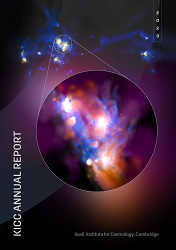This is a conference in honour of Prof. Robert Kennicutt. It will be held at the Institute of Astronomy and the adjoining Kavli Institute for Cosmology at the University of Cambridge (UK) from Monday July 2th to Friday July 6th, 2018.
The coming of age of many facilities and new instrumental capabilities, including ALMA, JWST, VLT/MUSE, etc., and the continuous stream of ground-breaking results from HST, Spitzer, Herschel, and others, has ushered a new era for the investigation of star formation in galaxies. As we inch our way into the formulation of a predictive theory of star formation, we are now in a position to relate the newly formed stars to their natal gas at all scales, from giant molecular clouds up to entire galaxy populations, in present-day galaxies back to the dawn of cosmic time. Observational studies linking molecular gas mass to star formation activity are crucial to shape our understanding of the physical processes that drive the conversion of gas into stars, and to identify the dominant positive/negative feedback processes that trigger and quench star formation in a wide variety of galactic environments. Balancing these physical processes over time, galactic disks self-regulate their level of star formation and become galactic ecosystems, in analogy to many other ecosystems observed on earth. This conference will bring together experts on all aspects of star formation to assess the progress made so far, compare achievements in different areas, and lay the ground for future directions. Among the goals is to bring together different communities and to discuss the role of planned and future facilities in unraveling the link between star formation and gas in galaxies.
The major themes of this meeting are:
* The star formation law in different gas phases (LSB, HSB, atomic or molecular gas). (Non-)linearity of the star formation law.
* Triggering (dynamics, environment, instabilities) and quenching mechanism of star formation (morphology, AGN, stabilizing bulges, environment effects in gas stripping, or starvation)
* Self-regulation of star formation through positive/negative feedback processes (SN, AGN, ...)
* Star formation at small scales: What drives the small-scale substructure of star formation in galaxies? What threshold holds for SF in different regimes?
* Cosmic evolution of star formation: starbursts census with redshifts
Confirmed invited speakers
Angela Adamo (Stockholm University)
Joao Alves (University of Vienna)
Frédéric Bournaud (Laboratoire AIM Paris-Saclay)
Clare Dobbs (University of Exeter)
Bruce Elmegreen (IBM T.J Watson Research Center)
Neal Evans (University of Texas)
Natasha Förster Schreiber (Max-Plank-Institut für extraterrestrische Physik)
Diederik Kruijssen (Universität Heidelberg)
Mark Krumholz (Australian National University)
Adam Leroy (Ohio State University)
Margaret Meixner (Space Telescope Science Institute)
Sally Oey (University of Michigan)
Ying-jie Peng (Peking University)
Amelie Saintonge (University College London)
Eva Schinnerer (Max Planck Institute for Astronomy, Heidelberg)
Stefanie Walch (University of Cologne)
Fabian Walter (Max Planck Institute for Astronomy, Heidelberg)
SOC:
Daniela Calzetti (co-Chair)
Ilse De Looze (co-Chair)
Maud Galametz (co-Chair)
Monica Relaño-Pastor (co-Chair)
Gustavo Bruzual
Françoise Combes
Andy Fabian
Timothy Heckman
Linda Tacconi
Serena Viti
Anthony Whitworth
We look forward to welcoming you to Cambridge to an exciting and vibrant meeting full of discussions and new ideas.



